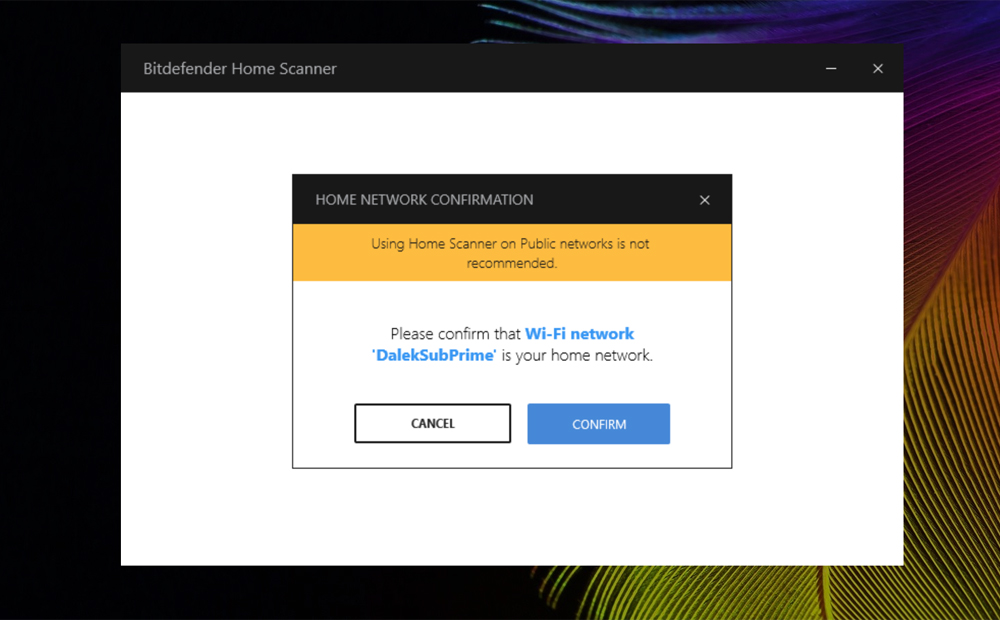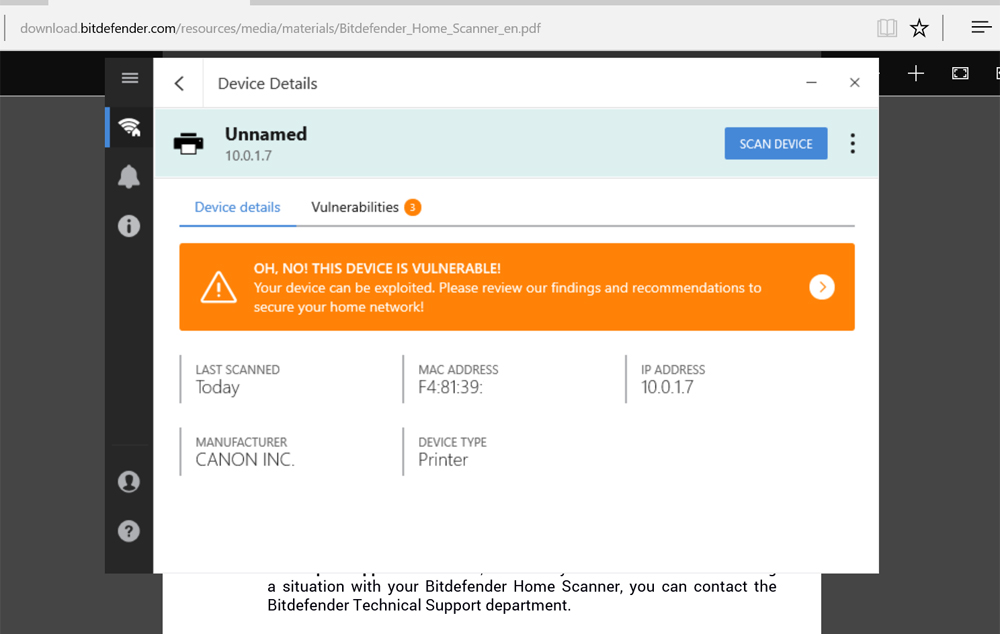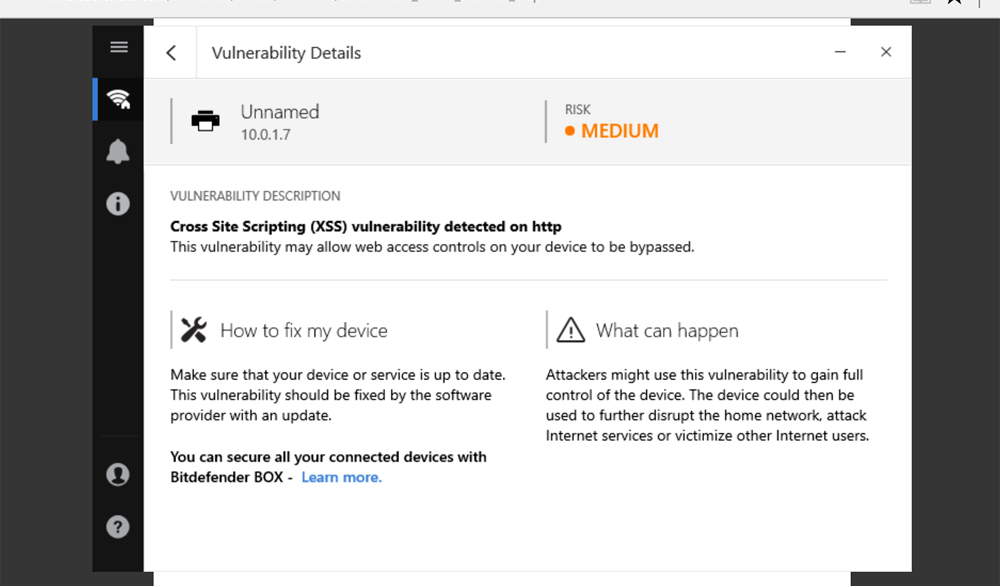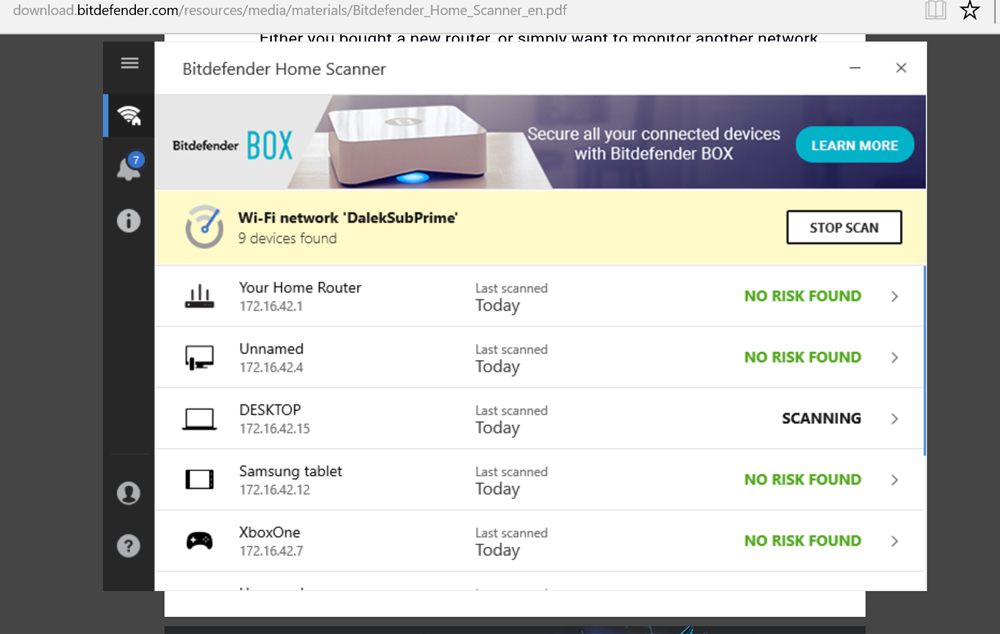This Free Tool Finds Vulnerable Devices on Your Network
Bitdefender's Home Scanner analyzes all the devices on your home network, including smart-home devices, for common security flaws.
Here at Tom’s Guide our expert editors are committed to bringing you the best news, reviews and guides to help you stay informed and ahead of the curve!
You are now subscribed
Your newsletter sign-up was successful
Want to add more newsletters?

Daily (Mon-Sun)
Tom's Guide Daily
Sign up to get the latest updates on all of your favorite content! From cutting-edge tech news and the hottest streaming buzz to unbeatable deals on the best products and in-depth reviews, we’ve got you covered.

Weekly on Thursday
Tom's AI Guide
Be AI savvy with your weekly newsletter summing up all the biggest AI news you need to know. Plus, analysis from our AI editor and tips on how to use the latest AI tools!

Weekly on Friday
Tom's iGuide
Unlock the vast world of Apple news straight to your inbox. With coverage on everything from exciting product launches to essential software updates, this is your go-to source for the latest updates on all the best Apple content.

Weekly on Monday
Tom's Streaming Guide
Our weekly newsletter is expertly crafted to immerse you in the world of streaming. Stay updated on the latest releases and our top recommendations across your favorite streaming platforms.
Join the club
Get full access to premium articles, exclusive features and a growing list of member rewards.
Worried that your smart-home and Internet of Things devices might be vulnerable to attack? If so, Bitdefender may have just the tool for you.

Called the Bitdefender Home Scanner, it's a new tool that's designed to scan all the gadgets on your home Wi-Fi network, from computers to smart light bulbs to see if any exhibit well-known security flaws.
I tried Bitdefender Home Scanner both at home and in the office. While the tool didn't do a perfect job, it's definitely something you might want to add to your network-defense arsenal.
MORE: Best Antivirus Software and Apps
Bitdefender Home Scanner was a snap to download from the Bitdefender website and install on a Windows 10 or Windows 7 PC. There's no cost, but there is one string attached: You'll have to create a Bitdefender account and give Bitdefender your email address to use Home Scanner.
Oddly, the Bitdefender Home Scanner doesn't automatically launch upon installation. I had to navigate to my desktop, or to my list of applications, to start it.
Once that was done, the tool asked me to confirm whether the local network was indeed my home network. Although there's a Wi-Fi icon displayed, the scanner worked just as well on my workplace Ethernet network, and it took about 10 minutes to find 75 or so devices around the office.
Get instant access to breaking news, the hottest reviews, great deals and helpful tips.

There weren't many vulnerable devices at work, but when I ran the Bitdefender Home Scanner at home, the tool found some problems with two networked printers — a year-old Canon model and an older Hewlett-Packard device.

The HP printer apparently was vulnerable to a denial-of-service attack and remote code execution — i.e. malware infection. The Canon printer was vulnerable to both of those, plus a cross-site-scripting attack. The risk of remote code execution was classified as "Medium," but on the HP it was "High," without any clear explanation as to why.

In all cases, the Bitdefender Home Scanner recommended that I "make sure that [my] device or service is up to date." That was accompanied by a suggestion that "you can secure all your connected devices with Bitdefender Box," the company's home-network security appliance.
A few bugs to be ironed out
However, the Bitdefender tool wasn't initially able to find everything on my two home networks. I had to go into the settings menu on a Samsung Smart TV before that device would appear on the scanner's radar. Likewise, an Android tablet needed to toggle Airplane Mode before the scanner saw it, and it took a second full scan by the Bitdefender Home Scanner before the tool noticed my Xbox One.

Another quirk that should probably be fixed: The tool annoyingly kept seizing desktop focus every time it completed a major step in its overall scan, whether that step was discovering a new device or scanning another device for flaws. It's probably best to run Bitdefender Home Scanner while you're not doing anything else on the computer, or the constant shift of focus will drive you nuts.
The scanner also seizes focus to pop up a notification when a new device is added to the network. That was annoying at work, but would be very handy for someone at home who'd want to know when a strange device jumped aboard the Wi-Fi network.
There also doesn't seem to be any way to turn the scanner off. There's no "Exit" or "Quit" command in the sparse menus, and closing the interface didn't prevent notifications of new network devices from popping up. I finally had to go into Task Manager to kill the process manually.
One more Fing
Under the hood, the Bitdefender Home Scanner runs Nmap, a widely used free and open-source network-mapping tool. (Hollywood movies often show fictional hackers using Nmap.) A Bitdefender representative told me that the company added a few vulnerability scanners and a polished front end to the Nmap underpinnings.
For comparison, I ran Nmap itself, using the Zenmap front end, on a PC, and the Fing network-mapping app on my Android phone.
Nmap found even fewer devices than the Bitdefender Home Scanner could, picking up only my router, my (sleeping) Xbox One and the laptop I was working on. It didn't catch any of the various connected Android and iOS devices, or even the big Linux box sitting in the corner. Fing caught an iOS device the other two missed, but also missed the Linux box.

And of course, neither Nmap nor Fing could tell me whether any of the devices they found were vulnerable to any common attacks. Just because of that additional feature, the Bitdefender Home Scanner is well worth the effort to install and run.

Paul Wagenseil is a senior editor at Tom's Guide focused on security and privacy. He has also been a dishwasher, fry cook, long-haul driver, code monkey and video editor. He's been rooting around in the information-security space for more than 15 years at FoxNews.com, SecurityNewsDaily, TechNewsDaily and Tom's Guide, has presented talks at the ShmooCon, DerbyCon and BSides Las Vegas hacker conferences, shown up in random TV news spots and even moderated a panel discussion at the CEDIA home-technology conference. You can follow his rants on Twitter at @snd_wagenseil.
 Club Benefits
Club Benefits





